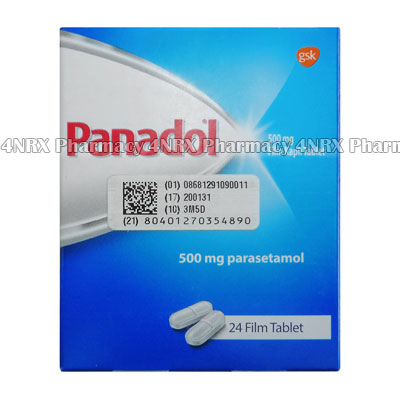 |
Home  Pain Pain  Panadol (Paracetamol) Panadol (Paracetamol) |
|
|||||||||
|
|
Panadol (Paracetamol)
What is Panadol (Paracetamol) used for? Panadol (Paracetamol) is a non-steroidal anti-inflammatory agent. It is used to decrease high body temperature. Additionally, it has an analgesic effect. Paracetamol is the main active ingredient of the medication. It prevents the formation of inflammation mediators, including chemical compounds and prostaglandins, which cause high body temperature. Panadol (Paracetamol) and other medications containing Paracetamol show low anti-inflammatory activity. It results from the fact that cell enzymes break down Paracetamol once it gets into the tissues. Panadol (Paracetamol) has antipyretic and analgesic effects at the level of the central nervous system. The maximum blood concentration is achieved within 0.5-2 hours after administration. Panadol (Paracetamol) is broken down in liver and is excreted through kidneys. It doesn`t disrupt the balance of electrolytes, doesn`t damage the mucous membranes of the digestive system, and doesn`t cause liquid retention. Panadol (Paracetamol) is prescribed for fever, induced by bacterial and viral infections (such as acute respiratory disease, influenza, acute respiratory viral infection, pharyngitis, tonsillitis, and others). It is indicated for painful menstruation; headache, including migraine; pain in joints and muscles, including body pain in the acute period of an infectious disease and rheumatic pain; nerve pain, and toothache. It is also prescribed to children for fever, caused by the teeth eruption. How should I use Panadol (Paracetamol)? Panadol (Paracetamol) tablets should be taken whole orally with a full glass of water. Normally, a single dose prescribed to adults and children above the age of 12 years ranges from 500 to 1,000mg (which equals to 1-2 tablets). Maximum acceptable daily dose may reach 4,000mg, however it has to be split into 4 doses during the day. Standard daily dose prescribed to children aged from 3 to 6 months is 250-350mg; 6 to 12 months -500mg; 1 to 3 years -750mg; 3 to 6 years -1,000mg; 6 to 9 years -1,500mg; 9 to 12 years -2,000mg. The interval between every administration of Panadol (Paracetamol) has to be 4 hours. It can be taken without prescription for up to 3 days. In case if there is no improvement within the 3 days of treatment, consult your physician. What are the side effects of Panadol (Paracetamol)? Panadol (Paracetamol) is well tolerated by children and adults. Nevertheless, in some cases treatment with Panadol (Paracetamol) may lead to the following side effects:
Panadol (Paracetamol) must not be combined with alcohol. Concurrent treatment with other non-steroidal anti-inflammatory drugs may increase the risk of renal cancer. Please Note Panadol (Paracetamol) should not be used in patients with hyperbilirubinemia and other liver disorders, hypersensitivity to the active ingredient or any other non-steroidal anti-inflammatory drugs, as well as diseases involving the deterioration of the blood counts. It is also counter indicated in children below 3 months of age, people suffering from alcohol addiction and kidney diseases. It can be prescribed to pregnant and breast feeding patients only upon the discretion of their physician. 
|
||||||||||||||||||